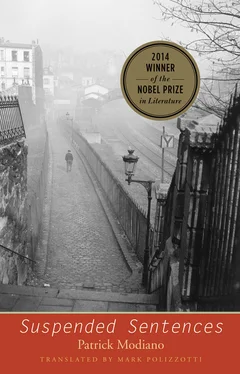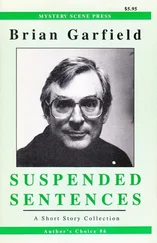I wonder where certain people are today, whom I knew in that same period. I try to imagine in which city I might possibly run into them. I’m certain they’ve left Paris for good. And I think of Rome, where one finally ends up, and where time has stopped like on the clock in the Carrousel gardens in my childhood.
That summer, we’d found ourselves for several months in another foreign city, Vienna, and we were even planning to stay there forever. One night, near the Graben, we had gone into a café that one accessed through the main entrance of an apartment building. The foyer led to a large room with a grayish floor that looked like a dance school or the disused lobby of a hotel, or even a train station cafeteria. Light shone from neon tubes on the walls.
I had discovered this place by chance during a stroll. We sat at one of the tables arranged in rows, widely separated from each other. There were only three or four customers talking among themselves in low voices.
Of course, it was I who’d dragged Jacqueline to the Café Rabe that evening. But that girl, who was exactly my age, had a knack for attracting ghosts. In Paris, on the Sunday evening when I’d noticed her for the first time, she was in such strange company … And now, at the Café Rabe, who would we meet because of her?
A man came in. He was wearing a tweed jacket. He walked with a heavy limp to the counter at the back of the room, helped himself to a pitcher of water and a glass. With his broken gait, he came to sit at the table next to ours.
I wondered if he was the café owner. He must have overheard a few words of our conversation, for he turned toward us:
“Are you French?”
He had a very slight accent. He smiled. He introduced himself:
“Rudy Hiden …”
I had already heard that name without knowing whom it belonged to. His face with its regular features could have been a movie actor’s. At the time, his name, Rudy, had struck me: it was my brother’s name. And he evoked romantic images: Mayerling, Valentino’s funeral, an Austrian emperor who suffered from melancholia in some long-distant past.
We exchanged a few polite words with Rudy Hiden, like travelers who don’t know each other but happen to be sitting at the same table in the restaurant car. He told us he had lived in Paris, that he hadn’t been back in a long time, and that he missed the city very much. He bade us farewell with a ceremonious movement of his head when we left the Café Rabe.
Later, I learned that he’d been the greatest goalie in the history of soccer. I tried to find photos of him and of all his Austrian friends with melodious names who’d been on the Vienna Wunderteam, and who had dazzled the spectators in the stadiums with their grace. Rudy Hiden had had to quit soccer. He had opened a nightclub in Paris, on Rue Magellan. Then a bar on Rue de la Michodière. He had broken his leg. He had returned to Vienna, his native city, where he lived as a vagrant.
I can still see him under the neon lights of the Café Rabe, coming toward us with his broken gait. Is it only by chance that I came across this letter of F. Scott Fitzgerald’s, which reminds me of him? “I honestly think that all the prizefighters, actors, writers who live by their own personal performances ought to have managers in their best years. The ephemeral part of the talent seems, when it is in hiding so apart from one, so ‘otherwise,’ that it seems it ought to have some better custodian than the poor individual with whom it lodges and who is left with the bill.”
Which he will settle at the Café Rabe.
I had met Jacqueline one Sunday evening, in Paris, in the sixteenth. A curious arrondissement. Claude Bernard, for instance, whose police file I’d like to peruse to learn more about the man I met at nineteen, often dined at restaurants in that quarter. The members of the Rue Lauriston gang as well. Pagnon lived in a deluxe furnished apartment at 48-bis Rue des Belles-Feuilles. He frequented the riding club in Neuilly and even the grounds of the Cercle de l’Etrier in the Bois de Boulogne, which he had requisitioned one afternoon through “Henri” so that his mistress could go horseback riding all on her own, without being bothered by anyone …
Rack my brains as I might for memories of the sixteenth arrondissement, I find only empty apartments, as if everything has been repossessed — like in Simone Cordier’s living room.
That Sunday evening, it was raining. It was in October or November. Claude Bernard had arranged to meet me for dinner in a restaurant on Rue de la Tour. The day before, I’d sold him the complete works of Balzac — the Veuve Houssiaux edition. I arrived first. The only customer. I waited in a small room with light wood paneling. Photos of jockeys and riding instructors, most of them inscribed, decorated the walls.
Three people made a noisy entrance: a blond man of about fifty, tall and well built, wearing a hunting jacket and an ascot; a dark-haired man who was much younger and shorter than the first; and a girl about my age, with chestnut hair and light-colored eyes, wrapped in a fur coat. The restaurant owner made a beeline toward them, a smile on his face.
“What’s new?”
Short-and-dark gave him a smug up-and-down look.
“Vierzon to Paris in an hour and a quarter … There was nobody on the road … Averaged a hundred miles an hour … These two were scared witless.”
He nodded toward the girl and the blond man in the riding jacket. The latter shrugged.
“He thinks he’s a racing driver. He forgets I was racing with Wimille and Sommer when I was twenty …”
The three men burst out laughing. As for the girl, she seemed to be sulking. The owner showed them to a table facing mine. He hadn’t noticed my presence. The dark-haired man had his back to me. The other one was seated next to the girl, on the bench. She hadn’t removed her fur. The telephone rang. The phone was on the bar, to my right.
“It’s for you, Monsieur …”
The owner held out the receiver to me. I got up. The eyes of all three of them were on me. The dark-haired one had even turned around. Claude Bernard apologized for not being able to join me. He was “stuck”—he said — in his house on the Ile des Loups “owing to an unexpected visit.” He asked if I had enough on me to pay for dinner. Fortunately, I’d kept the three thousand francs from the sale of the Balzac in the inner pocket of my jacket. When I hung up, my eyes met the girl’s. I didn’t dare leave the restaurant without ordering, as I would have had to ask for my coat, which a waiter had put in the cloakroom at the back of the restaurant.
I returned to that place several times. With Claude Bernard, or else alone. Claude Bernard was surprised at my constancy in going to Rue de la Tour. I wanted to know more about that girl who didn’t take off her fur coat and who always looked sullen.
Every Sunday evening, they made their entrance at around nine-thirty. They were in a group of four or five, sometimes more. They were loud, and the owner treated them with affable deference. The girl sat at their table, very stiff, and always next to the blond in the riding jacket. She never said a word. She seemed absent. Her fur coat clashed with the youthfulness of her face.
“Vierzon to Paris in an hour and a quarter … There was nobody on the road …” The echo of those words, which I’d heard that first Sunday, is now so faint that I have to strain my ears. The years have covered them over with static. Vierzon … They were returning from Sologne, where the blond in the hunting jacket owned a chateau and property. He bore the title of marquis. Later, I learned his name, which conjured up the wasp-waisted pages of the Valois court and Morgane le Fay, from which his family claimed to descend.
Читать дальше












